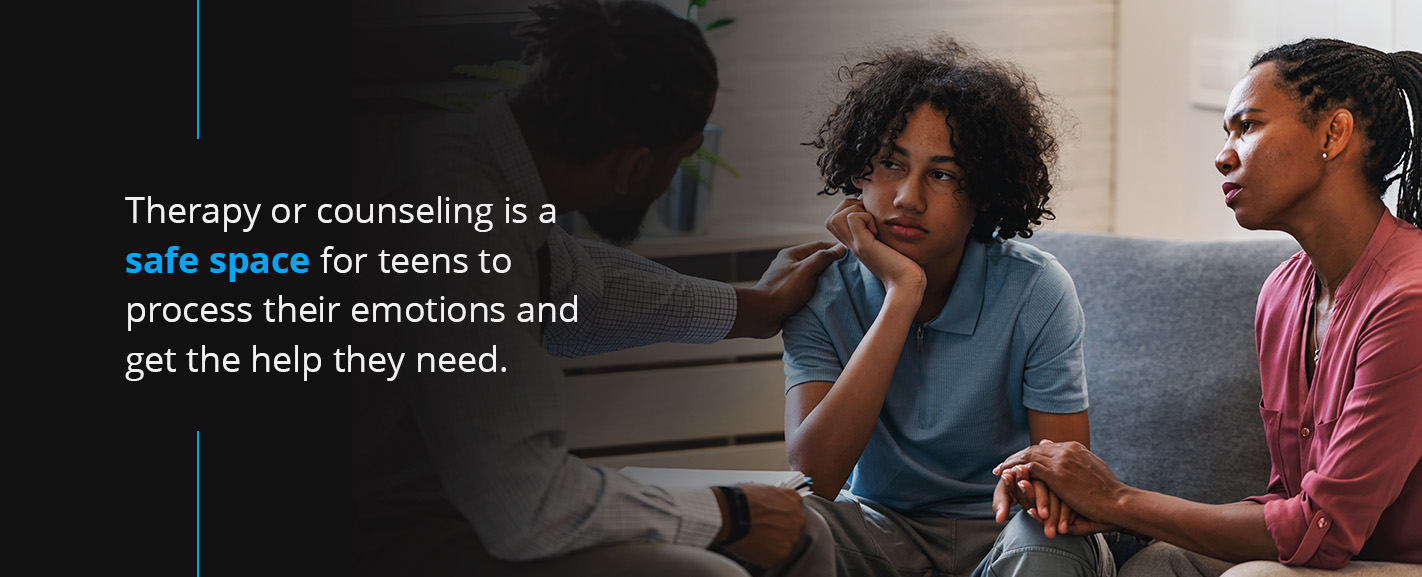In this guide, we’ll give you five ways to help your teen with mental health issues and build a strong relationship with them. You’ll also learn how to spot the signs of mental health disorders so you can address any issues sooner. With our advice and strategies, you can work toward helping your teenager understand themselves better and improve their mental health.
1. Talk About Mental Health
Feelings of stress and sadness can creep up slowly, and your teen may be unaware of their emotional and psychological well-being. Without the correct education, they can become confused or feel alone. Talking openly about mental health and explaining common disorders to your teen can help them identify and understand their feelings.
If you also live with a mental health disorder, you can share your experiences to lessen feelings of shame or loneliness. Emphasize the importance of asking for help when things become challenging. If your teen receives a mental health disorder diagnosis, ensure you understand and can explain the details to them.
2. Ask About Their Feelings
Teenagers suffering from mental health issues may feel uncomfortable talking about their feelings. To encourage them to open up, have regular check-ins. Assess their mood first, as they may not want to share when they are grumpy, tired or upset. If you sense it’s the right time, ask them how they feel. Begin with usual topics, like asking them how their day was. Listen carefully and be supportive and accepting of what they say.
Try to remain unjudgmental and avoid giving solutions — most children just want to be heard and loved when sharing their feelings. If they are hesitant or resist, give them space while letting them know you care. Continue initiating check-in conversations to build trust. Inviting your teen to do an activity together, like cooking or gardening, may help you create more organic conversations with less pressure.
3. Create Routines
Life may feel unpredictable and overwhelming as your teenager’s body, friends, feelings, and thoughts evolve and change. When they are going through a lot, decision-making — even for simple, everyday tasks like getting dressed — can start to cause stress. Establishing a routine is a successful way to combat these feelings and support your child’s mental wellness. Studies show that a consistent schedule for everyday tasks can reduce stress and improve well-being.
Start small by creating a structure around meal times and bedtime. You can ask your teen for help developing their routines so they feel more in control of their life. The idea is to establish a routine that feels comforting, not limiting. Be flexible and willing to help them change their routine as needed.
4. Teach Self-Care
Looking after oneself mentally and physically is crucial to mental health management. Self-care can involve eating healthy foods, exercising, getting enough sleep, seeing friends, relaxing, and doing things you love. Teenagers can learn to prioritize self-care when their parents model this behavior for them and are encouraging. Show your teen how you care for yourself and handle big feelings like stress and sadness.
You can also develop a self-care plan with your teen. Talk to them about their self-care goals and slowly incorporate small changes into their daily routine. It can take many years for them to start doing it for themselves, but stay consistent. Children who establish a foundation for self-care in their teenage years are more likely to become healthier and happier adults.
5. Explore Therapy
Sometimes, caregivers feel unprepared to tackle difficult issues with their children, or their children prefer to talk to others about their feelings. When this happens, try not to blame yourself or your child. Everyone copes with hard times in their own way and does the best with what they have. Instead of struggling by yourself, working with a mental health professional can help.
Therapy or counseling is a safe space for teens to process their emotions and get the help they need. Therapists employ proven treatments to help teens cope and learn to live with mental health disorders. You can also speak with a therapist for advice and help with supporting your teen. Working with a trained professional can make parenting more manageable, especially if your family is going through hard times.
Signs Your Teen Is Struggling With Mental Health Issues
Determining if your child has mental health issues can be challenging, but there are a few signs you can look out for. Keep in mind that it is common to experience some of these symptoms every once in a while. However, consistently seeing multiple signs can indicate potential concerns.
Look out for the following common signs of adolescent mental health issues, such as:
- Mood swings, irritability, anger, or sadness.
- Lack of motivation or interest in activities they previously enjoyed.
- Abuse of alcohol, drugs, or tobacco.
- Isolation and avoidance of social activities.
- Insomnia, poor sleep, too much sleep, or daytime sleepiness.
- Sudden changes in friend groups.
- Self-harm or suicidal thoughts.
- Overwhelming thoughts and fears.
- Low self-esteem and lack of confidence.
- Unusual trouble with schoolwork.
- Disordered eating behaviors.
Contact Merrimack Valley Psychological Associates to Support Your Teen
If you want to know how to help your teen with their mental health, reach out to us at Merrimack Valley Psychological Associates. We are a group of licensed clinicians and psychologists serving Andover and the surrounding areas. We understand teens and mental health well and can offer a caring, safe space for them to talk. They will find it easier to relate to our youthful clinicians, who have special training in treating teenagers.
We use a flexible approach to our sessions, allowing us to adapt our style to accommodate your teen’s unique needs. Every treatment we use is clinically tested and shows statistical reliability to ensure the best results. We are equipped to handle a range of challenges, including anxiety, depression, anger, self-harm, addiction, eating disorders, grief, stress, and more.
Start your healing journey with us today by calling 978-482-7351 or by submitting a contact form online. We will schedule an appointment for you and answer any questions about our counseling.



